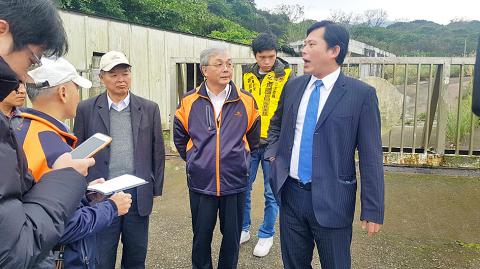New Power Party Executive Chairman Huang Kuo-chang (黃國昌) yesterday said that radioactive metal from an abandoned titanium dioxide plant in New Taipei City was illegally sold to scrapyards in central and southern Taiwan, but the Atomic Energy Council has insisted that it was not radioactive.
Police have found that since Dec. 19, at least four batches of scrap metal were illegally transported from the plant, but so far they have only tracked down one shipment, Huang said on Facebook.
The batch that police located was transported to Taichung’s Liougu (六股) before being sold to scrapyards in New Taipei City’s Taishan District (泰山) and Taoyuan’s Guanyin District (觀音), he said.

Photo: Lin Hsin-han, Taipei Times
The plant, which ceased operations in 1999 and has remained inactive, produced titanium dioxide using radioactive ilmenite.
Huang said that when inspecting the plant earlier yesterday, he learned from Liu Wen-chung (劉文忠), head of the council’s Fuel Cycle and Materials Administration, that Changhua County-based E-Top Metal Co in July 2017 reported finding radioactive scrap metal, but that the council did not test the metal for radiation until Monday.
“For one-and-a-half years, the company did not send the metal to the council’s Institute of Nuclear Energy Research and the council did nothing to track down where it came from,” Huang said.
He said that the council was “irresponsible,” and urged the Executive Yuan to launch an investigation into the matter and discipline the officials involved.
“The council has been unbelievably corrupt. What it did was completely unacceptable,” Huang said.
The missing radioactive scrap metal must be tracked down to protect public health and safety, he added.
On Monday last week, New Taipei City police notified the council that some of the scrap metal at the abandoned plant had been stolen, the council said in a statement.
After inspecting the plant, the council said that it found that some scrap metal had indeed been taken, but that it was not radioactive.
The council said that it reviewed the scrapyards’ recycling records and found that three batches of scrap metal totaling 7.1 tonnes had been sold by the plant from Dec. 21 to Jan. 9, but tests found no radioactivity.
Tests also determined that scrap metal sold by the plant that was previously suspected of being radioactive had actually come from somewhere else, it added.
The council said that it has asked E-Top Metal to follow procedures for handling radioactive metal, but added that it does not have the authority to intervene if the company does not comply by a certain date.
Tests showed that the metal was also not from the abandoned plant, it said, urging the owner of the plant to manage any remaining radioactive metals and waste.
Local police should increase patrols of the abandoned facility and install security cameras on the site, the council said.

POSITIVE DEVELOPMENT: Japan and the US are expected to hold in-depth discussions on Taiwan-related issues during the meeting next month, Japanese sources said The holding of a Japan-US leaders’ meeting ahead of US President Donald Trump’s visit to China is positive news for Taiwan, former Japan-Taiwan Exchange Association representative Hiroyasu Izumi said yesterday. After the Liberal Democratic Party’s landslide victory in Japan’s House of Representatives election, Japanese Prime Minister Sanae Takaichi is scheduled to visit the US next month, where she is to meet with Trump ahead of the US president’s planned visit to China from March 31 to April 2 for a meeting with Chinese President Xi Jinping (習近平). Japan and the US are expected to hold in-depth discussions on Taiwan-related issues during the

‘LIKE-MINDED PARTNER’: Tako van Popta said it would be inappropriate to delay signing the deal with Taiwan because of China, adding he would promote the issue Canadian senators have stressed Taiwan’s importance for international trade and expressed enthusiasm for ensuring the Taiwan-Canada trade cooperation framework agreement is implemented this year. Representative to Canada Harry Tseng (曾厚仁) in an interview with the Central News Agency (CNA) said he was increasingly uneasy about Ottawa’s delays in signing the agreement, especially as Ottawa has warmed toward Beijing. There are “no negotiations left. Not only [is it] initialed, we have three versions of the text ready: English, French and Mandarin,” Tseng said. “That tells you how close we are to the final signature.” Tseng said that he hoped Canadian Prime Minister Mark Carney

President William Lai (賴清德) yesterday bestowed one of Taiwan’s highest honors on Saint Vincent and the Grenadines (SVG) Ambassador Andrea Clare Bowman in recognition of her contributions to bilateral ties. “By conferring the Order of Brilliant Star with Grand Cordon on Ambassador Bowman today, I want to sincerely thank her, on behalf of the Taiwanese people, for her outstanding contribution to deepening diplomatic ties between Taiwan and SVG,” Lai said at a ceremony held at the Presidential Office in Taipei. He noted that Bowman became SVG’s first ambassador to Taiwan in 2019 and

A man walks past elementary school artworks at the Taipei Lantern Festival in Ximen District yesterday, the first day of the event. The festival is to run from 5pm to 10pm through March 15.